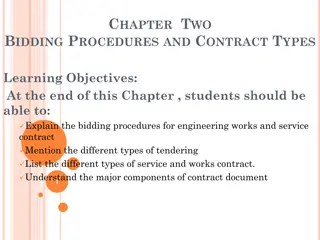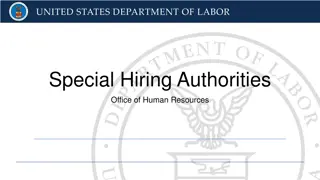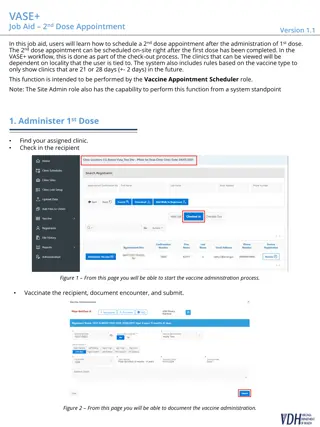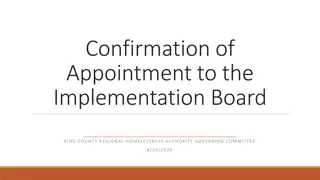
Companies Act 2013: Director Appointment & Qualification
Learn about the appointment and qualification of directors as per Chapter XI of the Companies Act 2013. Find out the minimum and maximum number of directors required for different types of companies, the process of appointing directors, and the necessary qualifications. Ensure compliance with the guidelines to effectively manage your company's board of directors.
Download Presentation

Please find below an Image/Link to download the presentation.
The content on the website is provided AS IS for your information and personal use only. It may not be sold, licensed, or shared on other websites without obtaining consent from the author. If you encounter any issues during the download, it is possible that the publisher has removed the file from their server.
You are allowed to download the files provided on this website for personal or commercial use, subject to the condition that they are used lawfully. All files are the property of their respective owners.
The content on the website is provided AS IS for your information and personal use only. It may not be sold, licensed, or shared on other websites without obtaining consent from the author.
E N D
Presentation Transcript
Chapter XI of Companies Act, 2013 Appointment and Qualification of Director Prepared By: Sabin Acharya PAMS & Associates Company Director 1
149.Company to have Board of Directors Every company shall have a Board of Directors consisting of individuals as directors and shall have a. a minimum number of three directors in the case of a public company, two directors in the case of a private company, and one director in the case of a One Person Company; and b. a maximum of fifteen directors(public/private/one-person company): Provided that a company may appoint more than fifteen directors after passing a special resolution: 2
152.Appointment of directors. 1. Where no provision is made in the articles of a company for the appointment of the first director, the subscribers to the memorandum who are individuals shall be deemed to be the first directors of the company until the directors are duly appointed and in case of a One Person Company an individual being member shall be deemed to be its first director until the director or directors are duly appointed by the member in accordance with the provisions of this section. 2. Save as otherwise expressly provided in this Act, every director shall be appointed by the company in general meeting. 3. No person shall be appointed as a director of a company unless he has been allotted the Director Identification Number under section 154. 4. Every person proposed to be appointed as a director by the company in general meeting or otherwise, shall furnish his Director Identification Number and a declaration that he is not disqualified to become a director under this Act. 3
6. 5. A person appointed as a director shall not act as a director unless he gives his consent to hold the office as director and such consent has been filed with the Registrar within thirty days of his appointment in such manner as may be prescribed: a. Unless the articles provide for the retirement of all directors at every annual general meeting, not less than two-thirds of the total number of directors of a public company shall i. be persons whose period of office is liable to determination by retirement of directors by rotation; and ii. save as otherwise expressly provided in this Act, be appointed by the company in general meeting. b. The remaining directors in the case of any such company shall, in default of, and subject to any regulations in the articles of the company, also be appointed by the company in general meeting. 4
7. c. At the first annual general meeting of a public company held next after the date of the general meeting at which the first directors are appointed in accordance with clauses (a) and (b) and at every subsequent annual general meeting, one-third of such of the directors for the time being as are liable to retire by rotation, or if their number is neither three nor a multiple of three, then, the number nearest to one-third, shall retire from office. d. The directors to retire by rotation at every annual general meeting shall be those who have been longest in office since their last appointment, but as between persons who became directors on the same day, those who are to retire shall, in default of and subject to any agreement among themselves, be determined by lot. e. At the annual general meeting at which a director retires as aforesaid, the company may fill up the vacancy by appointing the retiring director or some other person thereto. Explanation. For the purposes of this sub-section, total number of directors shall not include independent directors, whether appointed under this Act or any other law for the time being in force, on the Board of a company. a. If the vacancy of the retiring director is not so filled-up and the meeting has not expressly resolved not to fill the vacancy, the meeting shall stand adjourned till the same day in the next week, at the same time and place, or if that day is a national holiday, till the next succeeding day which is not a holiday, at the same time and place. 5
b. If at the adjourned meeting also, the vacancy of the retiring director is not filled up and that meeting also has not expressly resolved not to fill the vacancy, the retiring director shall be deemed to have been re-appointed at the adjourned meeting, unless i. at that meeting or at the previous meeting a resolution for the re-appointment of such director has been put to the meeting and lost; ii. the retiring director has, by a notice in writing addressed to the company or its Board of directors, expressed his unwillingness to be so re-appointed; iii. he is not qualified or is disqualified for appointment; iv. a resolution, whether special or ordinary, is required for his appointment or re- appointment by virtue of any provisions of this Act; or v. section 162 is applicable to the case. Explanation. For the purposes of this section and section 160, the expression retiringdirector means a director retiring by rotation. 6
164.Disqualifications for appointment of director 1. A person shall not be eligible for appointment as a director of a company, if a. he is of unsound mind and stands so declared by a competent court; b. he is an undischarged insolvent; c. he has applied to be adjudicated as an insolvent and his application is pending; 7
d. he has been convicted by a court of any offence, whether involving moral turpitude or otherwise, and sentenced in respect thereof to imprisonment for not less than six months and a period of five years has not elapsed from the date of expiry of the sentence: Provided that if a person has been convicted of any offence and sentenced in respect thereof to imprisonment for a period of seven years or more, he shall not be eligible to be appointed as a director in any company; e. an order disqualifying him for appointment as a director has been passed by a court or Tribunal and the order is in force; f. he has not paid any calls in respect of any shares of the company held by him, whether alone or jointly with others, and six months have elapsed from the last day fixed for the payment of the call; g. he has been convicted of the offence dealing with related party transactions under section 188 at any time during the last preceding five years; or h. he has not complied with sub-section (3) of section 152.[DIN shall be allotted to him or any other number as may be prescribed] 8
2. No person who is or has been a director of a company which a. has not filed financial statements or annual returns for any continuous period of three financial years; or b. has failed to repay the deposits accepted by it or pay interest thereon or to redeem any debentures on the due date or pay interest due thereon or pay any dividend declared and such failure to pay or redeem continues for one year or more, shall be eligible to be re-appointed as a director of that company or appointed in other company for a period of five years from the date on which the said company fails to do so.(see example in next page) 3. A private company may by its articles provide for any disqualifications for appointment as a director in addition to those specified in sub-sections (1) and (2)[but can not reduce]: 9
Example to understand Q1. Mr. Sabin is a director of Aryatech Commercial Pvt Ltd, which has not filed its annual returns for continuous 3 financial year. State whether Sabin can be reappointed in Aryatech Commercial Pvt. Ltd (same company). Also, State whether Sabin can be appointed as a director in Dadri Commercial Pvt Ltd (other company). Answer: Disqualification specified u/s 164(2) of Companies Act, 2013 applies if a company makes a default in filing of financial statement or annual returns for 3 continuous financial year. Such disqualification shall remain in force for 5 years. In the present case, Aryatech Commercial Pvt Ltd, in which Mr. Sabin is a director, has not filed its annual return for continuous 3 FY. In the given case, Mr. Sabin(Director of Aryatech) shall neither be re-appointed in Aryatech Commercial Pvt Ltd nor be appointed in Dadri Commercial Pvt Ltd for a period of 5 years. 10
165.Number of directorships 1. No person, after the commencement of this Act, shall hold office as a director, including any alternate directorship, in more than twenty companies(Public and Private) at the same time: Provided that the maximum number of public companies in which a person can be appointed as a director shall not exceed ten(only public). Explanation. For reckoning the limit of public companies in which a person can be appointed as director, directorship in private companies that are either holding or subsidiary company of a public company shall be included. Public+ Private<=20, provided public <=10 Example: Mr. Tullu is already a director of 19 companies. Out of these companies, 10 are public companies and 9 are private companies. Mr. Tullu is being appointed as a director in Tata steel(public co). You as a CA, advised him whether he can do so as per Companies Act,2013. Would your answer be changed if TATA steel is substituted by Dadri Commercial Pvt Ltd(private co). Answer: As per section 165, Mr. Tullu can not be appointed in TATA steel since his directorship shall be 11 which is more than 10(public). Answer will be changed in 2nd scenario, Since both condition are satisfied so he can be appointed in Dadri Commercial Pvt Ltd ( public+ private=20 and public=9) 11
167. Vacation of office of Director The office of a director shall become vacant in case a. he incurs any of the disqualifications specified in section 164; Provided that where he incurs disqualification u/s 164(2), the office of the director shall become vacant in all the companies, other than the company which is in default under that sub-section. (see example in next page) b. he absents himself from all the meetings of the Board of Directors held during a period of twelve months with or without seeking leave of absence of the Board; c. he acts in contravention of the provisions of section 184 relating to entering into contracts or arrangements in which he is directly or indirectly interested; d. he fails to disclose his interest in any contract or arrangement in which he is directly or indirectly interested, in contravention of the provisions of section 184; e. he becomes disqualified by an order of a court or the Tribunal; f. he is convicted by a court of any offence, whether involving moral turpitude or otherwise and sentenced in respect thereof to imprisonment for not less than six months: Punishment for contravention: He shall be punishable with imprisonment for a term which may extend to 1 year or fine not less than 1 lakh but upto 5 lakh or both. 12
Example to understand 167(1) Mr. Salman holds directorship in 3 Companies namely Aryatech commercial, Dadri commercial and A2P realtech Pvt Ltd. First 2 companies(Aryatech and Dadri) has been filling Annual return regularly but A2P has not filed its annual returns before 3 FY. Further Salman wants to be appointed in Lextracker Pvt Ltd. You as a Chartered Accountant, advised him what will be the consequence in above case. Answer: Disqualification u/s 164(2) applies since A2P Realtech has not been able to file AR for 3 FY. Mr. Salman khan is disqualified to be appointed in other company. Hence, He can not be appointed in Lextracker pvt ltd. Moreover, As per section 167, He shall vacate all companies except the default company. In our example Salman must vacate his directorship in Aryatech and Dadri Commercial but he will be director in A2P till his term of directorship and he can not be appointed or reappointed upto 5 years from the default date. 13
168.Resignation of director 1. A director may resign from his office by giving a notice in writing to the company and the Board shall on receipt of such notice take note of the same and the company shall intimate the Registrar in such manner, within such time and in such form as may be prescribed and shall also place the fact of such resignation in the report of directors laid in the immediately following general meeting by the company: Provided that a director shall also forward a copy of his resignation along with detailed reasons for the resignation to the Registrar within thirty days of resignation in such manner as may be prescribed. 2. The resignation of a director shall take effect from the date on which the notice is received by the company or the date, if any, specified by the director in the notice, whichever is later: Provided that the director who has resigned shall be liable even after his resignation for the offences which occurred during his tenure. 3. Where all the directors of a company resign from their offices, or vacate their offices under section 167, the promoter or, in his absence, the Central Government shall appoint the required number of directors who shall hold office till the directors are appointed by the company in general meeting. 14
169.Removal of directors 1. A company may, by ordinary resolution, remove a director, not being a director appointed by the Tribunal under section 242, before the expiry of the period of his office after giving him a reasonable opportunity of being heard: 2. A special notice shall be required of any resolution, to remove a director under this section, or to appoint somebody in place of a director so removed, at the meeting at which he is removed. 3. On receipt of notice of a resolution to remove a director under this section, the company shall forthwith send a copy thereof to the director concerned, and the director, whether or not he is a member of the company, shall be entitled to be heard on the resolution at the meeting. 4. Where notice has been given of a resolution to remove a director under this section and the director concerned makes with respect thereto representation in writing to the company and requests its notification to members of the company, the company shall, if the time permits it to do so, a. in any notice of the resolution given to members of the company, state the fact of the representation having been made; and b. send a copy of the representation to every member of the company to whom notice of the meeting is sent 15
Thank You everyone for listening!! 16






















